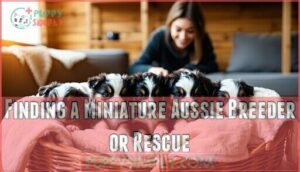This site is supported by our readers. We may earn a commission, at no cost to you, if you purchase through links.

Mini Aussies face hereditary conditions like hip dysplasia, progressive retinal atrophy, and multidrug resistance mutations that complicate treatments, with vet bills easily reaching thousands.
Look for plans covering congenital conditions, accidents, and wellness care, with annual premiums typically ranging $300-$800 depending on your location and coverage level.
The right policy protects both your Mini Aussie’s health and your financial peace of mind when those inevitable "what’s wrong with my dog" moments arrive.
Understanding breed-specific coverage options reveals which insurers truly deliver value.
Table Of Contents
- Key Takeaways
- Miniature American Shepherd Breed Overview
- Mini Aussie Characteristics
- Mini Aussie Exercise and Training Needs
- Are Miniature Aussies Good Family Dogs?
- Caring for Your Mini Aussie
- Finding a Miniature Aussie Breeder or Rescue
- Why Get Pet Insurance for Your Mini Aussie?
- Frequently Asked Questions (FAQs)
- How much does a mini American Shepherd cost?
- How much is AKC Pet Insurance per month?
- Is $5000 enough for pet insurance?
- What is the life expectancy of a Miniature American Shepherd?
- What age should I start Mini Aussie insurance?
- Does insurance cover genetic testing for hereditary conditions?
- Can I use any veterinarian with coverage?
- What waiting periods apply for new policies?
- Are prescription medications and supplements covered?
- Conclusion
Key Takeaways
- You’ll need comprehensive coverage since Mini Aussies face expensive hereditary conditions like hip dysplasia ($7,000 surgery) and cataracts ($4,000 treatment) that can devastate your budget without protection.
- Start insurance immediately when you bring your puppy home around 8 weeks old to avoid pre-existing condition exclusions and ensure maximum coverage for breed-specific health risks.
- Expect to pay $300-$800 annually for quality coverage, but compare plans carefully since one major vet bill can cost more than years of premiums combined.
- Look for policies that cover congenital conditions, accidents, and wellness care while allowing you to use any licensed veterinarian for maximum flexibility.
Miniature American Shepherd Breed Overview
The Miniature American Shepherd represents a fascinating breed origin story that began in 1968, when dedicated breeders selectively bred smaller Australian Shepherds to create a compact companion.
This dog breed emerged from western United States ranches, where ranchers wanted the same herding intelligence and loyalty in a more manageable size.
The Mini Aussie history shows rapid development through careful breeding programs focused on maintaining essential breed characteristics while reducing physical size.
These dogs display distinctive physical traits, standing 13-18 inches tall and weighing 20-40 pounds, with medium-length double coats in various colors.
Their temperament overview reveals high energy, intelligence, and strong herding instincts packed into a smaller frame.
The breed received official breed recognition as the Miniature American Shepherd, distinguishing it from its Australian Shepherd ancestors.
While generally healthy, potential health issues include hip dysplasia and eye conditions common to herding breeds, making early health screening important for prospective owners.
Mini Aussie Characteristics
Your mini american shepherd stands 13-18 inches tall and weighs 20-40 pounds, making them perfect apartment companions with big dog personalities.
These intelligent herders showcase stunning coat colors including black, blue merle, red, and red merle with distinctive white markings.
Their temperament traits blend loyalty, alertness, and gentle affection, though they can be reserved with strangers initially.
Size variations within the breed standard guarantee you’ll find the right fit for your lifestyle.
Grooming needs include regular brushing to manage their double coat’s moderate shedding.
Activity levels run high, requiring mental stimulation alongside physical exercise.
Smart mini aussie health planning includes considering miniature aussie insurance early, as these active dogs benefit from extensive dog insurance coverage protecting against breed-specific concerns and unexpected veterinary costs.
Mini Aussie Exercise and Training Needs
How do you channel your Mini Aussie’s boundless energy into productive training sessions? These intelligent herding dogs require consistent exercise and mental challenges to prevent destructive behaviors from taking root.
Your Mini Aussie’s high activity level demands a structured approach that satisfies both their physical needs and sharp intellect. Their strong herding instincts can manifest as nipping or chasing children, making early training essential for harmonious family life.
Focus on these key training areas:
- Mental stimulation through puzzle toys and scent work games
- Agility training to build confidence and burn excess energy
- Recall training for reliable off-leash adventures and safety
- Leash manners to prevent pulling during neighborhood walks
- Impulse control exercises to manage their enthusiastic, reactive nature
Consistent positive reinforcement works best with this breed’s sensitive temperament. Short, frequent training sessions prevent boredom while building lasting behavior patterns. Consider purchasing appropriate agility equipment to enhance your training sessions. Remember, a tired Mini Aussie is a well-behaved companion.
Are Miniature Aussies Good Family Dogs?
Your Miniature American Shepherd’s boundless energy and intelligence make them exceptional family companions when matched with the right household.
Child Compatibility ranks high for Mini Aussies, as they naturally bond with kids and display protective instincts without aggression.
However, their herding background means they might nip at heels during play, requiring consistent training to redirect this behavior.
Energy Levels demand serious consideration—these dogs need active families who can provide mental stimulation and physical exercise daily.
Without proper outlets, they’ll create their own entertainment, often involving your favorite shoes.
Training Challenges arise from their intelligence; they’ll outsmart inconsistent owners but thrive with firm, positive reinforcement.
Space Requirements aren’t as demanding as you’d expect.
While they prefer yards, apartment living works if you’re committed to regular exercise.
Temperament Concerns center around their need for socialization to prevent overprotectiveness.
Dog insurance becomes invaluable for family dogs, covering unexpected injuries during their adventurous play sessions and protecting your budget while keeping your four-legged family member healthy.
Caring for Your Mini Aussie
Proper care keeps your Mini Aussie healthy and happy throughout their life.
Grooming Needs are minimal—brush weekly to prevent matting and bathe only when dirty.
Diet Guidance involves feeding high-quality food appropriate for their age and activity level.
Mental Health requires daily puzzle toys and training sessions since boredom leads to destructive behaviors.
Socialization Tips include exposing puppies to various people, animals, and environments early.
Common Ailments like hip dysplasia and eye conditions necessitate regular vet checkups.
Regular veterinary visits are critical for early detection of potential health problems.
Consider MAS pet insurance or insurance for Miniature American Shepherds to manage unexpected costs, as herding breed insurance often covers hereditary conditions these active dogs face.
Finding a Miniature Aussie Breeder or Rescue
Finding your perfect Miniature Australian Shepherd requires careful research, whether you’re choosing reputable breeders or exploring rescue options.
Responsible breeders health test their dogs for genetic conditions like hip dysplasia, eye abnormalities, and the MDR1 mutation.
You’ll want to see OFA or CERF certifications for parent dogs, and watch for breeder red flags like refusing health documentation or rushing sales.
Quality breeders socialize puppies, provide health guarantees, answer your questions thoroughly, and accept returned dogs if circumstances change.
Avoid puppy mills that prioritize profit over health.
The adoption process through rescue organizations offers another rewarding path.
Rescues vet dogs for health and temperament issues, though you’ll want to meet potential pets first and review their medical history.
Both breeders and rescue options require due diligence to guarantee you bring home a healthy, well-adjusted companion who’ll thrive in your family.
To find a good source, consider browsing for mini breeder products.
Why Get Pet Insurance for Your Mini Aussie?
Mini Aussies can develop expensive hereditary conditions like hip dysplasia, which costs up to $7,000 for surgery, and cataracts requiring $4,000 procedures.
Pet insurance covers these breed-specific health issues, protecting you from unexpected veterinary bills that could reach thousands of dollars, often involving conditions like cataracts and requiring expensive procedures.
One major vet bill can cost more than years of insurance premiums combined.
Mini Aussie breed-specific conditions can cost thousands in vet bills without insurance protection.
Cover Hereditary Conditions
Pet insurance provides financial protection when your Miniature American Shepherd develops genetic conditions like progressive retinal atrophy or hip dysplasia.
Early enrollment is critical, as policy exclusions prevent coverage for pre-existing conditions. Extensive dog insurance coverage protects against breed-specific health risks, including chronic conditions requiring ongoing management.
Genetic testing can identify breed predispositions before symptoms appear, helping you secure coverage for hereditary conditions that affect up to 37% of Mini Aussies with MDR1 gene mutations. You can research options for hereditary condition coverage to prepare for potential future needs.
Compare Pet Insurance Plans
When you’re ready to choose coverage for your Mini Aussie, comparing pet insurance plans systematically helps you find the right balance of protection and affordability.
Start by evaluating premium costs across different insurance providers comparison options, then examine deductible choices that fit your budget. Next, review coverage options for breed-specific conditions like hip dysplasia and eye issues that commonly affect Miniature American Shepherds.
Here’s your insurance comparison checklist:
- Premium Costs – Compare monthly rates from top dog insurance plans
- Deductible Choices – Evaluate annual vs. per-incident deductible structures
- Coverage Options – Check accident, illness, and hereditary condition benefits
- Waiting Periods – Review time delays before coverage begins
- Exclusions Explained – Understand what conditions won’t be covered
This pet insurance comparison approach guarantees you’ll select thorough protection without overpaying for unnecessary features.
Frequently Asked Questions (FAQs)
How much does a mini American Shepherd cost?
Miniature American Shepherds typically cost between $1,000 to $3,000 from reputable breeders, though you’ll find prices vary based on bloodline quality, location, and breeder reputation throughout the country.
How much is AKC Pet Insurance per month?
Wondering what you’ll pay? AKC Pet Insurance typically costs between $10 and $60 monthly, with the average monthly premium around $ Your actual cost depends on your pet’s age, breed, and location.
Is $5000 enough for pet insurance?
Annual limits of $5,000 might fall short for major health issues in Miniature American Shepherds. Hip dysplasia surgery alone can cost $7,000, and cataract surgery reaches $4, Consider higher limits for better protection.
What is the life expectancy of a Miniature American Shepherd?
You’ll typically enjoy 12-15 years with your Miniature American Shepherd, though some reach 16-17 years with proper care, regular vet checkups, and healthy lifestyle choices throughout their lives.
What age should I start Mini Aussie insurance?
An ounce of prevention’s worth a pound of cure.
You should start insurance coverage immediately when bringing your Mini Aussie puppy home, ideally around 8 weeks old.
Early enrollment prevents pre-existing condition exclusions and guarantees maximum coverage.
Does insurance cover genetic testing for hereditary conditions?
Most pet insurance plans don’t cover genetic testing itself, but they’ll cover treatment for hereditary conditions like hip dysplasia and eye problems once symptoms appear, making early enrollment essential.
Can I use any veterinarian with coverage?
Most pet insurance policies let you visit any licensed veterinarian in the United States.
You’ll pay upfront, then submit claims for reimbursement, giving you complete freedom to choose your preferred vet.
What waiting periods apply for new policies?
Most pet insurance companies enforce waiting periods before coverage begins, typically 14 days for illnesses and 48 hours for accidents, though Trupanion waives these if you enroll on pickup day.
Are prescription medications and supplements covered?
Most pet insurance policies cover prescription medications your vet prescribes for covered conditions, accidents, and illnesses. However, supplements, vitamins, and over-the-counter medications typically aren’t covered unless specifically recommended for treatment.
Conclusion
Protecting your Mini Aussie will literally save you from financial catastrophe when hereditary conditions strike unexpectedly.
Miniature American shepherd pet insurance becomes essential given this breed’s predisposition to hip dysplasia, eye problems, and genetic mutations that require specialized treatments.
You’ll find extensive coverage plans ranging from basic accident protection to premium wellness packages, with most owners paying $300-$800 annually for peace of mind.
Smart comparison shopping guarantees you’ll secure the right policy before health issues emerge, making those inevitable vet visits manageable rather than wallet-crushing experiences.










